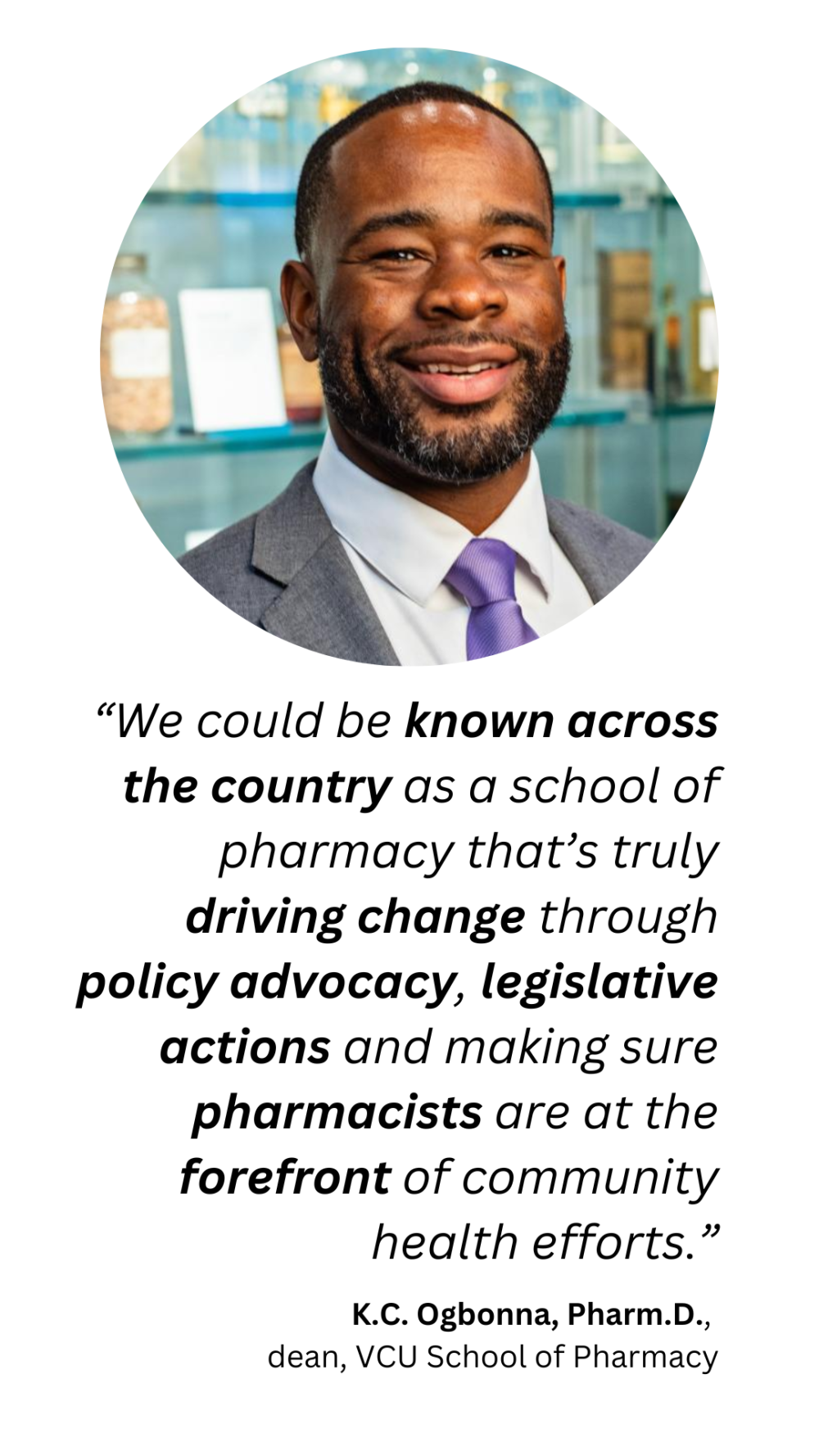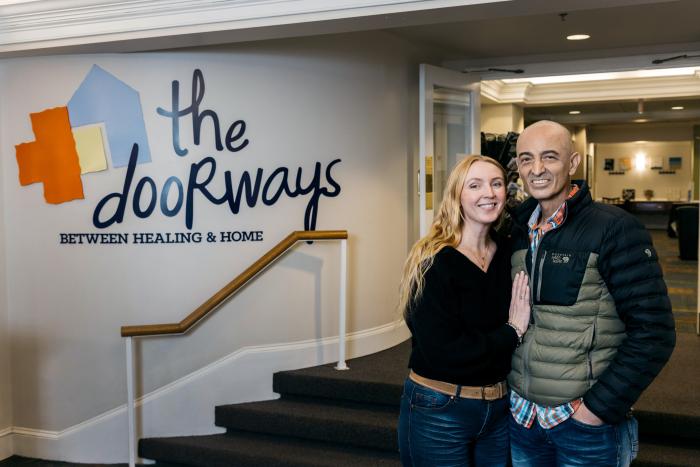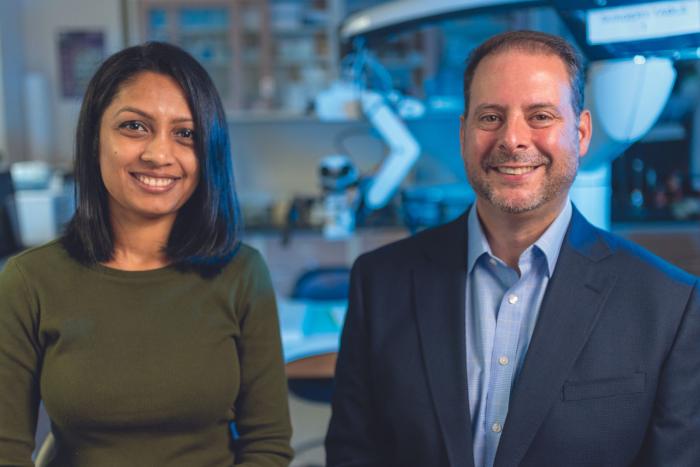A Pharmacy School Built to Meet Modern Challenges, Opportunities
It is an extremely exciting time for the VCU School of Pharmacy — and by extension, greater Richmond and all of Virginia have reason to look ahead at public health with enthusiasm.
From educating the next generation of pharmacists who will approach the profession in an entirely new patient-centered way, to training a pharmaceutical manufacturing workforce that will help bring critical medicine production back to U.S. soil, to testing the safety of medications for health systems across the region, the school is poised to directly improve health, safety and the economy in Central Virginia and throughout the country.
The school’s new dean, K.C. Ogbonna, Pharm.D., is leading these efforts and ensuring the school meets the coming challenges and opportunities within the pharmacy profession and the pharmaceutical manufacturing industry.
“We have a great history here at VCU School of Pharmacy — 125 years of not just pharmaceutical education, but thinking critically about how to push the envelope,” Dr. Ogbonna said. “Over the next 125 years, what do we want to be known for?”
Although not yet a reality, offering debt-free education is one of the ways in which Dr. Ogbonna would like to see the school lead. “Students are looking at what they want to go into and how they want to serve, but finances often come first,” he said. “If we can remove that barrier, we’re going to get the best and brightest students who are committed to improving the human condition.”
Another opportunity for the school to innovate is in pharmaceutical manufacturing.
“Our supply chains are very fragile — we don’t have a whole lot of production capability here in the United States,” said Rosemary Gibson, senior advisor at the Hastings Center and author of ChinaRX. “We have to diversify those supply chains and establish some production of those most essential generic drugs closer to home.”
 The VCU School of Pharmacy has directly addressed this challenge by establishing the nation’s first Ph.D. program in pharmaceutical engineering. The doctoral program, a collaboration between the School of Pharmacy and the VCU College of Engineering, will focus on research and training students in areas of drug product development such as continuous manufacturing and drug-containing nanomaterials. Its multidisciplinary curriculum will offer students unique professional development opportunities and will cover advanced topics in the field, experimental techniques and scientific integrity, along with extensive directed and independent cross-disciplinary research.
The VCU School of Pharmacy has directly addressed this challenge by establishing the nation’s first Ph.D. program in pharmaceutical engineering. The doctoral program, a collaboration between the School of Pharmacy and the VCU College of Engineering, will focus on research and training students in areas of drug product development such as continuous manufacturing and drug-containing nanomaterials. Its multidisciplinary curriculum will offer students unique professional development opportunities and will cover advanced topics in the field, experimental techniques and scientific integrity, along with extensive directed and independent cross-disciplinary research.
At the same time, Dr. Ogbonna said, “The commonwealth is going to be a beacon for what is happening across the country as it relates to reshoring efforts. The I-95 corridor is going to lead to strong pharmaceutical manufacturing and helping link the academic side with the industry partnership side to make sure there’s no longer that valley of death where good ideas go.”
Quality and safety of generic drugs is another critical component in public health, and an area where the School of Pharmacy is a regional leader in keeping people safe.
“We have offshored so much production to other countries where the FDA does not have a full flung regulatory system,” Gibson said. “So, we don’t have a level playing field and we don’t have level quality assurance. There is an opportunity here to test products.”
The School of Pharmacy runs a bioanalytical lab that enables it to provide surveillance testing for health systems throughout the region to ensure medications are safe for patients.
The point at which patients receive most of these medications is also evolving. Pharmacists are increasingly interacting with patients and providing services in new ways.
“I strongly believe that pharmacy needs to move away from only be reimbursed for product to being reimbursed for services,” said Jon Roberts, a member of the VCU School of Pharmacy Class of 1979 and former executive vice president and COO at CVS Health. “The school can play a role in helping shape what those clinical services look like.”
Dean Ogbonna agrees.
"We could be known across the country as a school of pharmacy that’s truly driving change through policy advocacy, legislative actions and making sure pharmacists are at the forefront of community health efforts,” he said.
It takes many people and many ideas moving together in the same way to meet some of these opportunities and challenges head-on. Part of that evolution stems from philanthropy.
“As I think about how pharmacy is changing and the role the school plays,” Roberts said, “I believe in giving back what the school enabled me to achieve in my career to help other students as they embark on their careers in pharmacy.”
“How do we create a workforce that is truly ready to change what healthcare looks like not just today, but tomorrow,” Dean Ogbonna said. “We need donors rallying around our faculty, our staff and our students. And making a commitment to say, ‘we also believe in the school of pharmacy and there are great years ahead.’”
If you would like to learn about ways to support the VCU School of Pharmacy as it prepares pharmacists and drug manufacturers for the future, contact Louie Correa, the school’s senior director of development, at 804-828-3016 or lacorrea@vcu.edu.


